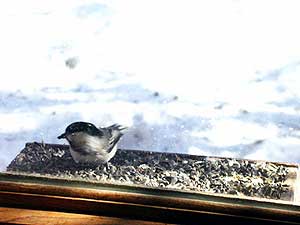 than Colorado chickadees by Ned Rozell April 1, 2004
Vladimir Pravosudov of the University of California Davis' department of psychology performed the study to test the theory that northern birds would be better at hiding and finding seeds than birds in a more moderate climate. He chose to capture birds in Anchorage, which has a day length of about 5 hours, 30 minutes on Dec. 22, and compare them to birds he captured near Windsor, Colorado, about 50 miles north of Denver, where the Dec. 22 day length is about 9 hours, 15 minutes. With the help of biologist Colleen Handel of the U.S. Geological Survey in Anchorage, Pravosudov captured 15 black-capped chickadees using a mist net (a net made of very fine thread) at bird feeders around Anchorage in fall 2000. He later captured 12 black-capped chickadees near Windsor, Colorado. All the birds were brought to his lab at the University of California Davis, where he gave them the same food and amount of daylight for 45 days. After 45 days he tested eight birds from Alaska and eight from Colorado in a room with 70 caching holes drilled in wooden blocks and trees. In late summer through fall, black-capped chickadees gather and hide seeds, insects and other foods to retrieve later, when they have fewer hours of daylight to feed and less food is available. Though black-capped chickadees live their entire lives within a few square acres, the species ranges from as far north as Anaktuvuk Pass to as far south as New Mexico. All black-capped chickadees cache food, but Pravosudov and other researchers wanted to find out whether northern birds are better at hiding and finding food because of shorter days and colder temperatures. The tests supported that notion. The Alaska birds cached about twice as many sunflower seeds as the Colorado birds and later found them with about one quarter as many tries per seed. The Alaska birds performed about the same as the Colorado birds on a test of learning to associate a color with a food, but Pravosudov said the Alaska birds also had a larger hippocampus, an area of the brain linked to memory. The results of the experiment did not surprise Susan Sharbaugh, an Alaska expert on chickadees and a research associate at the University of Alaska's Institute of Arctic Biology. Alaska's winters probably do a good job of choosing birds that have good memories, she said. "It's a great example of natural selection," she said. "Tough winters winnow out the ones that can't remember where their caches are. In the lower 48, if a chickadee has a good memory, it's fine; up here you have to have a great memory." A cold January in Fairbanks may have taken its toll on black-capped chickadees in 2004, Sharbaugh said. The chickadee deaths in the cold might also support Pravosudov's finding. "This year, I think we lost a pile of chickadees in that 40 below weather, maybe ones that weren't so good at caching," Sharbaugh said.
This column is provided as
a public service by the Geophysical Institute, University of
Alaska Fairbanks, in cooperation with the UAF research community.
Ned Rozell is a science
writer at the institute.
|
||
